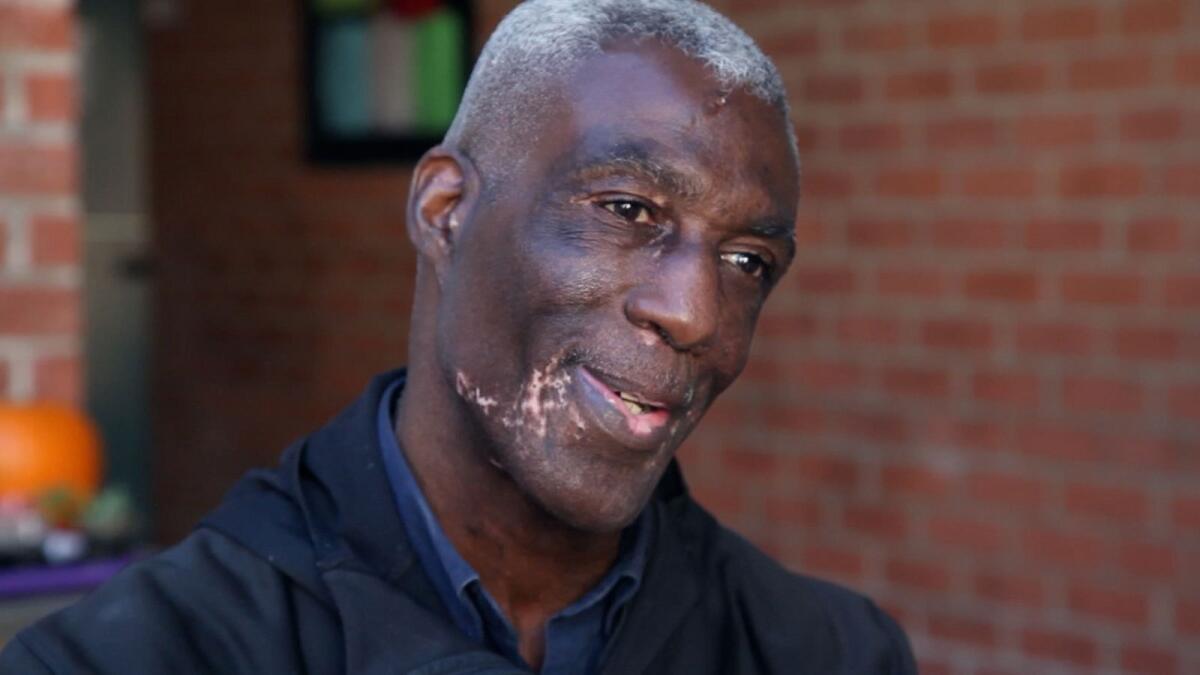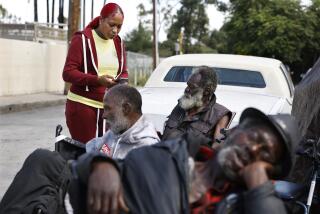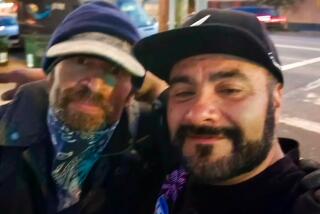Formerly homeless, he now delivers ‘survival kits’ to those on streets

Twice a year, Los Angeles’ homeless get a backpack that can make living on the streets a little more bearable. Blanket, Band-Aids, socks, sunblock, water, wool cap. Those are just a few of the things in the pack.
Ezzie Richey remembers when the backpack was dropped at his feet. Someone said, “Here, take this.”
It was at a bad time in his life. “I had given up,” said the Army veteran. “I didn’t even care anymore. I didn’t see it working. And then I started asking myself, ‘Why am I still here?’ ”
Richey mindlessly shrugged the pack on and began to walk away. “Why don’t you open the backpack up and see what’s in it?” someone asked.
So he did. Turns out, the most important thing Richey found inside was hope.
An Alabama native, Richey relocated to Los Angeles in 1998 to start fresh. He was desperately trying to move past the deaths of several family members, including his mother, that had left him emotionally shattered. “I’d never really gotten over [it],” said the silver-haired man with a lingering sadness. Zenobia Richey died of cirrhosis of the liver after struggling with alcoholism, an addiction her son would later cycle through.
To add to his grief, Richey’s identical twin sons, born premature, died when they were just a few months old. Then his brother Kenneth was shot to death. “There was a lot of stuff going down, and I guess I was running from it,” the soft-spoken Richey reflected. “But it seems like I ran right into it again when I came to L.A.”
Richey carried the loss of his mother, twin babies and brother with him for years. After a while, it became too much for him to deal with. “I started drinking a whole lot, and then I found myself doing drugs,” Richey said. His wife eventually divorced him.
But Richey was a military man. He served in the 5th combat support hospital unit at Ft. Bragg in North Carolina and in the 2nd Infantry Division in Korea. Defeat wasn’t something he accepted easily, so he did his best to pick himself up.
And for a while, luck seemed to be on his side. He found work as a Metro bus driver in L.A. But he wanted more out of his new, cleaned-up lifestyle.
He enrolled in Los Angeles Southwest College to study sociology. But soon a falling-out with his aunt, with whom he was living at the time, left him homeless.
Richey said it was a precarious situation to be a 50-something homeless college student. During the day he took exams and made presentations, and at night he was sleeping in parks.
He somehow managed to keep his homelessness a secret from classmates and was able to continue attending school thanks to a government Pell Grant.
Richey kept up appearances by sneaking into public restrooms to bathe and shave. “Just because I was homeless didn’t mean I had to look it,” he explained. “I didn’t want nobody to know I was homeless.”
Richey learned the ABCs of street life while trying to keep up with his college curriculum. “Surviving kicks in. I got to eat. I got to find somewhere to sleep. Whatever clothes I have need cleaning. I got to find a place to wash them,” he said. “Those two years felt like two decades.”
Richey became a nomad. After school, he’d go from shelter to shelter across the city hoping to find a spot to sleep and a meal. “I was feeling everything that comes with wanting to end your life,” Richey reflected.
Falling into a deep depression, Richey soon couldn’t maintain his grades -- his GPA dropped from a 3.8 to a 1.75 and he was put on academic probation. “It got to the point where it wasn’t about homework anymore,” Richey said. “It’s like everything’s stacked up against you.”
One day, while waiting for a sandwich in a food line, Richey decided he had had enough. That’s when Tom Bagamane dropped that backpack near his feet and said, “Here, take this.”
Bagamane is founder and chairman of Los Angeles-based nonprofit volunteer organization The Giving Spirit. He says the 15-year-old group’s mission is to “lift the veil off of homelessness.” Twice a year, volunteers pack survival kits for those living on the streets -- 2,600 this year. Volunteers then hand-deliver the kits to neighborhoods with high homeless populations and shelters across Southern California.
“Everything in those kits will allow someone to survive where they stand,” Bagamane said. “There’s toiletries, basic hygiene, food, hydration products, things to keep them warm, things to keep them dry.”
Richey said that when he opened the backpack Bagamane tossed at his feet, he “saw brand-new, name-brand stuff. But I saw more than that. I thought, whoever did this, this is love right here .… And at that time I didn’t think nobody cared.”
Richey is no longer homeless. He obtained his degree in sociology and lives in an apartment in South L.A., which he got through the Department of Veterans Affairs’ subsidized housing program.
His new mission is to go out to the streets with Giving Spirit volunteers and pass out kits to others in need, whom he calls “family.” He says the organization caught him “at the right moment” and he hopes to catch others at the right moment in their lives to make a difference.
“I see myself in people out here,” Richey said softly. “I’ve been there.”
He says the “small stuff” -- watching a movie and eating a meal -- is a big deal for him.
“A cup of water when I was homeless meant that I could bathe,” Richey said. “Clippers meant that I could look presentable. I thought about survival on the streets. Now … I’m cool.”
Twitter: @sarahHwaris
More to Read
Start your day right
Sign up for Essential California for news, features and recommendations from the L.A. Times and beyond in your inbox six days a week.
You may occasionally receive promotional content from the Los Angeles Times.







